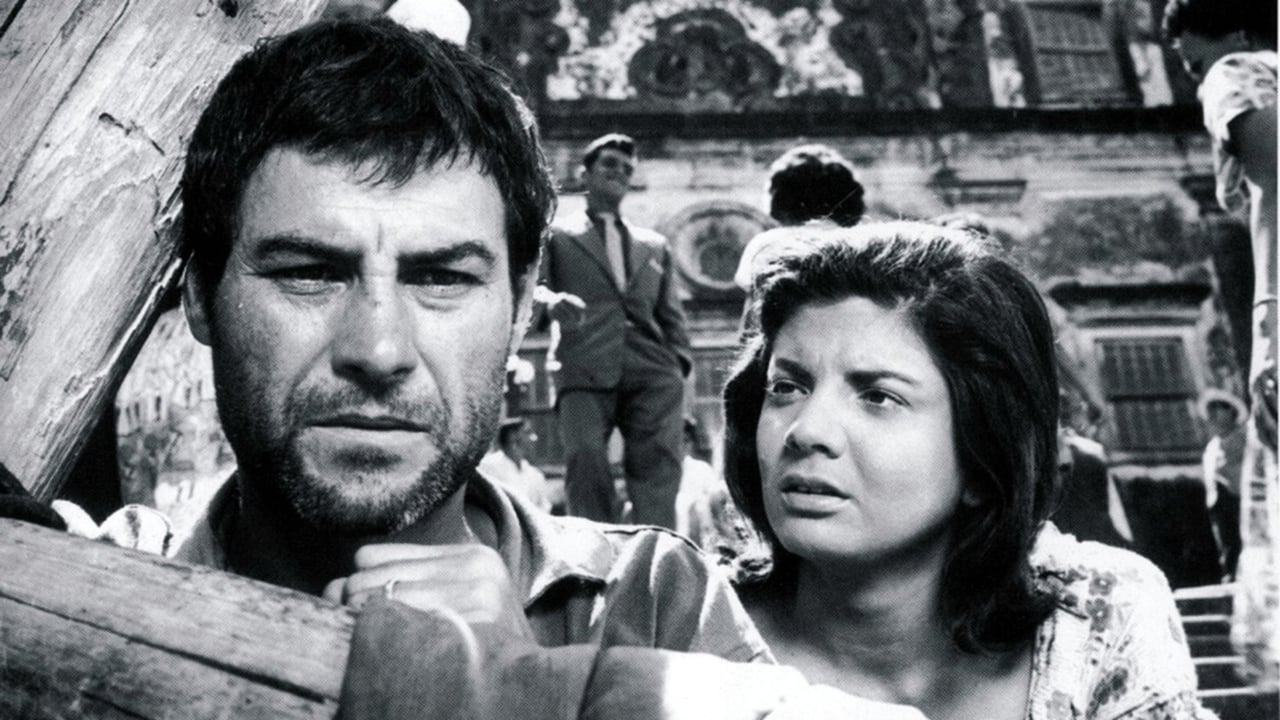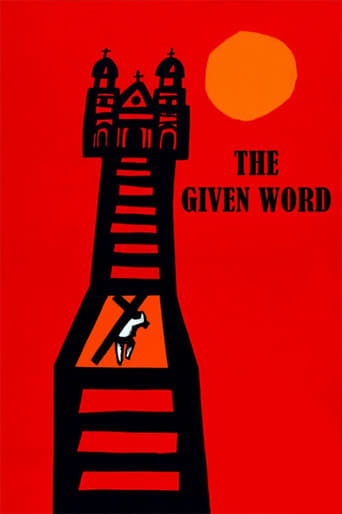



It's no definitive masterpiece but it's damn close.
View MoreExcellent but underrated film
This movie feels like it was made purely to piss off people who want good shows
View MoreIt’s fine. It's literally the definition of a fine movie. You’ve seen it before, you know every beat and outcome before the characters even do. Only question is how much escapism you’re looking for.
View MoreI found this Brazilian film included in the book 1001 Movies You Must See Before You Die, it is based on a famous stage play, it sounded like an interesting story, and was well rated by critics, so I looked forward to trying it. Basically Zé do Burro (Leonardo Villar) is a landowner from Nordeste, he has only one worldly possession, his best friend, a donkey named Nicholas, who he considers to have a soul. One day, the donkey is seriously wounded and falls deathly ill, out of despair, during a Candomblé session, dedicated to the goddess Yansan, Zé vows to carry a cross as large as Christ's, to the altar of the Saint Bárbara Church in Salvador, Bahia. After his donkey does recover from his illness, Zé builds a large cross with his own hands and tools, and begins his journey on foot to Bahia, accompanied by his wife Rosa (Glória Menezes). Zé arrives outside the steps of the church, which is closed, he is forced to wait for it to open, local pimp Bonitão (Geraldo Del Rey) is the only person to come and greet them, he offers to take Rosa to a small hotel, while Zé keeps his promises and stays with the cross. The local priest Father Olavo (Dionísio Azevedo) greets Zé on the steps, he is surprised but satisfied with the faith shown by him, until the detail that the promise had been done in a Candomblé session comes up in conversation. The priest berates Zé for impiety, believing his pledge and reasons behind it are "pagan", and forbids him from entering the church, soon many people attempt to manipulate the innocent and naïve Zé. The local Candomblé worshippers want to use him as a leader against the discrimination they suffer from the Roman Catholic Church, and sensationalist newspapers transform his promise to give away his land into a "communist". A crowd surrounds the church steps, the police are called by the zealots, when Zé tries to force the door to the church using the cross as a battering-ram, they order him to leave, but he faces up to them. Then a brawl breaks out, a gunshot is heard, the crowd cease fighting when they see that it is Zé who has been shot by the police, to prevent his way into the church. Zé-do-Burro lies dead by his cross, it's then that the black community, Candomblé worshippers, take his body, put him on the cross, and carry him inside the church to the altar of his favourite saint, they are unopposed by the priest or anyone. Also starring Norma Bengell as Marly, the prostitute, Othon Bastos as the Reporter and Antônio Pitanga as Coca, the capoeira player. This black-and-white picture is a really powerful story, a simple man making a religious vow who will not rest until it is done, having to contend with the impoverished people questioning whether his intentions are truly for God, as well as corruption and political issues, and the hounding of the media, a brilliantly provocative, fascinating and gripping drama. It was nominated the Oscar for Best Foreign Language Film (the Brazilian and South American film to be nominated). Very good!
View MoreI didn't enjoy this movie. Yes, I understand it is a touching story and yes, I can understand the praises and awards it got (at least the reasons I do). But this is not a pleasant movie. It's harsh to see the one good guy being so badly misunderstood and mistreated. All this man, who is very poor and doesn't bother a soul, is trying to do is simply to keep a promise. What harm would that do to anyone? Despite being ignored the way he is, this man doesn't give up on his promise, such is his loyalty and determination. He tries everything but nothing works. The ending becomes increasingly harder and more depressing. In the end, he is killed and "crucified" like Jesus was.Leonardo Villar is superb in his acting as this nice, innocent man.There is some nice Brazilian cinematography and the huge church where the poor man wants to take the big and heavy cross is particularly beautiful.
View MorePoor, simple peasant farmer Zé do Burro (Leonardo Villar, in a rock-solid performance) and his wife Rosa (Glória Menezes, appropriately unglamorous) leave their small cropland in the back country of Bahia. Zé is lugging a huge wooden cross on his shoulders under rain and shine to place it in the altar of St. Barbara's church in Salvador, 42 km away, as an offering for the miraculous healing of his ailing donkey. But the local priest (Dionísio Azevedo, blunt and one-dimensional) won't let Zé in when he learns the promise of the offering was made to an image of Iansã, a Candomblé goddess who is "analogous" to the Catholics' St. Barbara in Brazilian religious syncretism. Zé won't give up his promise and the conflict is set, with public commotion, opportunists on the spot and tragedy in the air."O Pagador de Promessas" was based on a hit play of the same title, written by famous leftist author Dias Gomes (who didn't want big-movie-star-but-little-experienced-director Anselmo Duarte to direct the screen version). Duarte ultimately got the rights, and he made a faithful adaptation — so faithful in fact that the film looks and sounds stagy, though the restless mob of onlookers to the events on the church's imposing stairway gives the film a welcome "open air" feel.The story is the fight for the beliefs of an individual -- Zé, who's the only "good guy" in the movie -- against fierce opposition from "bad guys": Catholic priests (who are arch villains here), the media (the press and TV), the police, political interests (there is an offer for Zé to support a congressman in an upcoming election) and the opportunists who seek to take advantage of the situation: the pimp Bonitão, the journalist played by Othon Bastos, the popular poet Dedé, the bar owner, and even Zé's own wife Rosa, who's later torn with remorse. Zé's firmness — or stubbornness — is nowadays naively monolithic, but bold themes were addressed here: Catholicism vs Candomblé, Catholic Church power vs Catholic principles, private property vs land-sharing... (Contrary to one IMDb reviewer, though, the film was NOT chopped by censorship because of religious issues — it wasn't censored at all).The contrived subplot — Rosa's fling with pimp Bonitão (Geraldo del Rey, stiff but handsome) and her dispute with prostitute Marly (sexy Norma Bengell in a star-making role, with a great sneering scene near the end) -- is digressing rather than enriching. There is some nice camera-work by British D.P. Chick Fowle, but it's more stylish than organic. The best moments are the Candomblé ceremony at the very beginning and the dazzling Capoeira fights: the music is so hypnotic and the movements so serpentinely athletic that the film momentarily becomes electrifying."Pagador..." was Oscar-nominated for Best Foreign Film (it lost to Serge Bourguignon's cult "Dimanches de Ville d'Avray") and — to everyone's wild astonishment -- won the Golden Palm at Cannes in 1962 against formidable competition: Buñuel's "Exterminating Angel", Antonioni's "L'Eclisse", Germi's "Divorzio all'Italiana", Clayton's "The Innocents", Bresson's "Procès de Jeanne d'Arc", Cacoyannis' "Elektra", Tony Richardson's "Taste of Honey", Lumet's "Long Day's Journey...", Varda's "Cléo de 5 à 7", Satyajit Ray's "Devi"...WOW!! And remember François Truffaut himself was in the jury!. My bet is that, THROUGH "Pagador...", Cannes recognized some important issues at the time: a) the "free portion" of Latin America, as Brazil was then one of the few Latin American countries that had overcome a dictatorship (by Getúlio Vargas), and established a "stable" democracy with free elections; b) Brazil was then run by center- leftist President João Goulart (who would be deposed by a military coup 2 years later) who was making serious talk about Agrarian Reform, one of the film's themes and one of Latin America's central issues; c) the anticlerical, rebellious, independent, truth-searching sentiment attributed to "the ordinary man," the "peasant"; d) Brazil itself, who was definitely fashionable then, because of the Bossa Nova explosion, the international deification of soccer hero Pelé, the construction of Brazil's new capital Brasília regarded as a new architectural wonder, the huge success of 1959 Golden Palm and Oscar- winner French film "Black Orpheus" shot in Brazil in Portuguese and featuring Rio's Carnival, etc)."Pagador..." has undeniable assets, but it was already conservative and predictable in 1962. Contrary to what another reviewer here at IMDb wrote, it was NOT part of the Cinema Novo (Brazilian New Wave) movement; in fact Anselmo Duarte was always rejected by the Cinema Novo filmmakers (especially by Glauber Rocha) because he had come from the very studio system ideology (Vera Cruz and Atlântida) against which they were fighting. And though "Pagador..." followed three of the main dogmas of Italian Neo-Realism that were also adopted by Cinema Novo — shooting on location/use of non-professional actors (though only in bit roles here)/"ordinary people with ordinary problems" as theme — we're aware the whole time we're watching carefully staged scenes where improvisation, boldness and experimentalism remain alien.Anselmo Duarte will forever be inscribed in Brazilian film history as THE filmmaker who brought to Brazil its only Cannes Golden Palm. But 45 years later, it's only fair to admit that time hasn't been so kind to it. If you don't raise your expectations too much, if you forget that this one won a Golden Palm over several international (some of them immortal) masterpieces, you'll watch a decent story, never boring, honestly told. NOTE: "Pagador..." remains to this day the ONLY Latin-American film EVER to win the Cannes top prize since 1947, which says a lot about Cannes' ethnocentrism. Some eloquent numbers: as of 2006, Cannes' top prize films have come from Europe 43 times, against 15 from the US; 6 from Asia; and 1 each from Latin America, Africa and Oceania. Although the artistic supremacy of European cinema in the 20th century is undisputed, the proportion is highly debatable.
View MoreIt's really a shame that this masterpiece is constantly overlooked by All-Time Greatest Lists, even though it won the prestigious Palm d'Or at Cannes."The Bicycle Thieves" is frequently cited as the greatest entry into Social Cinema, yet unfortunately the public and the critics seem to forget the sheer beauty that "The Payer of Promises" is. While "Bicycle"'s influence is undeniable, "Payer" goes beyond that.Honest, multi-layered and amazingly contemporary, this is one of those movies that have admirably stood the test of time - specially if one considers the difficulty it is making Films in Brazil.Featuring incredibly believable and dramatic performances, a rich, vivid setting and neo-realist technique employed in an elegant and sincere manner, this movie should not be missed. I found impressive how well the film flows - nothing is there gratuitously and the pacing is pitch perfect.The amazing strength, courage and valor of Brazilian Cinema is a force to be reckoned with, as we take a look at the works of Film Makers such as Peixoto, Duarte, Rocha, Candeias, Bressane, Khouri, Salles and most recently, Meirelles. To list a very short list.In fact, I can say without fear that it is a better Film than The Bicycle Thieves. It is easily one of the Best Brazilian Films in History - if not one of the Best in Film History. Period.
View More